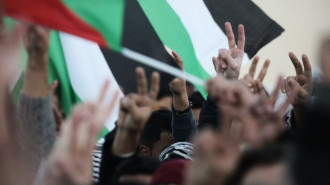Rise: Extraordinary Women of Colour Who Changed the World
Jameela Jamil is a British actor, presenter and activist working in the US and Negin Khpalwak is a female conductor who led the first Afghan women's orchestra. At first mention, a common thread between the two might not be obvious. Yet, there is one, found by 25-year-old Maliha Abidi – a Pakistani-American artist, author and a strong advocate for women of colour who have smashed through the barriers that have hindered them and their chosen field of work.
The similarities between them are so present that she decided to immortalise 100 of these women in a new book, Rise: Extraordinary Women of Colour Who Changed the World, with portraits of each trailblazer, accompanied by the story of how they overcame obstacles to rise and become great, game-changing and inspirational. The new title isn't without its curveballs, however, and some controversial figures may force the reader to challenge their current perspectives.
Rise is Abidi's second book after a successful and illustrated publication depicting notable Pakistani women called Pakistan for Women. Others may recognise Abidi's signature style from her lauded campaigns with UNHCR and viral posts launched from her TikTok and Instagram accounts, including of climate activists and Afghan women.
"I am constantly looking for stories to feel inspired by, but at the same time, it's also about sharing those stories and celebrating those stories as a woman, as a feminist"
In Rise, a venture with Saqi Books, Abidi approaches her work of solidarity this time by searching for inspirational women from the four corners of the world in a deliberate process to cover colour, religion and identity to ensure intersectionality and representation.
"I have a huge issue with companies and media platforms that talk about feminism and women empowerment, only on certain days, such as on International Women's Day," says Abidi, speaking to The New Arab.
By ensuring there was diversity geographically and by profession as well as through ethnicity – lesser-known stories can emerge and be celebrated alongside the big successes we're familiar with, she explains.
The subjects in Rise include performers, politicians, climate activists, sports personalities, artists, writers and many other professionals.
Some of those profiles are familiar household names, like Beyoncé Knowles-Carter and Malala Yousafzai. But, at the same time, there are obscurer bios like Esther Mahlangu, a Ndebele artist from South Africa whose traditional style ended up in worldwide collections and on the exterior of the luxury car brand BMW. Or Aisholpan Nurgaiv, an eagle hunter from Mongolia who at 13 became the first female winner of the central Asian country's annual Golden Eagle Festival, competing against older and more experienced men.
Prominent Arab and Muslim activists like Linda Sarsour and Loujain al-Hathloul also feature, as does the Lebanese singer Fairuz who became one of the most revered performers of the Arab world and a symbol of Lebanese unity during the civil war of the 70s and 80s.
The book evokes the familiarity of empowerment titles that have proven popular over the last few years like Slay in Your Lane, by Elizabeth Uviebinené and Yomi Adegoke or Bloody Brilliant Women by Cathy Newman.
Having created art for as long as she can remember, however, Abidi's vivid creations are the book's main attraction. Abidi used pre-existing pictures of each woman as a reference point, but the final composition of each portrait is a rendering of her conception, using mixed medium and, much of the time, bright and striking colours and backgrounds that felt right to her in that moment or for that person.
"Bright colours are also my way of tricking people into paying attention to the story," she tells The New Arab. Abidi explains that someone may come across one of her portraits on social media, attracted by the bold visuals and then stick around to find out more about the context. "Art is a very good tool I can use to translate complex issues into something that everybody can understand."
Abidi admits that it was only a few years ago, while in her teen years, that she herself didn't appreciate what being a woman of colour was about and the manifestations of racism: "I didn't truly understand the gender barriers. Even though I was going through all of those things: I was being underestimated as a woman of colour, I was being limited because of my gender."
As the years went by, she started to educate herself about racism and gender dynamics and women who had surmounted the same broad struggles she was experiencing.
"Despite the odds stacked against them, they were able to leave their mark and pave the way for so many other women of colour, including myself," she says.
"I am constantly looking for stories to feel inspired by, but at the same time, it's also about sharing those stories and celebrating those stories as a woman, as a feminist," she adds.
Abidi grew up with her father, grandmother and Aunt being the main family members in her life. Her dad was the one who kept Abidi going with her art and encouraged her to take it seriously by critiquing it from a young age as if it was in a gallery. He is also that person she has relied on since her aunt got married and grandmother passed on almost 10 years ago.
"I do feel incredibly inspired by strong women who are very independent. I think I relate to that just because that's how my father raised me to be," she explains. Although her peers have not felt the same way with some among her community taunting her to this day, she says, for being a child of divorce.
"One thing everybody can agree on is that that [these women] have worked hard for where they are and have fought for what they believed in. Whether you love them or you hate them"
Upending the status quo rarely happens without ruffling a few feathers, however, and Rise has its share of women who have divided opinions.
The late Benazir Bhutto, the two-term and first female Pakistani Prime Minister, for instance, was hailed as a feminist icon but at the same time, she faced accusations of corruption. The controversy around her eventually led to her demise on the electoral campaign trail when she was assassinated.
Popular figure Jameela Jamil of The Good Place fame is another personality who has been criticised for her outspoken tirades, publicly shaming female celebrities she believes encourage unhealthy habits, particularly in adolescents. Some, including herself, say this made her more troll than feminist but she still constantly defies "cancel culture" by elevating her body positivity messaging via different mediums. Even seemingly benevolent spokesperson Yousafzai receives her fair share of backlash for supposedly peddling Western narratives.
"One thing everybody can agree on is that that [these women] have worked hard for where they are and have fought for what they believed in. Whether you love them or you hate them," reasons Abidi.
"For a woman of colour, there isn't just one fight. The fight isn't just being a woman, the fight isn't just being a [person] of colour, it's both. The world for her is completely different – and how she navigates that is admirable."
Sophia Akram is a researcher and communications professional with a special interest in human rights, particularly across the Middle East.
Follow her on Twitter: @mssophiaakram
![Rise: Extraordinary women of colour who changed the world [Saqi Books]](/sites/default/files/styles/image_345x195/public/2021-10/Untitled%20%2810%29.png?h=d1cb525d&itok=btQSPAPA)

![Feminist icon and celebrated Lebanese singer, Fairuz [Maliha Abidi]](/sites/default/files/styles/medium_16_9/public/2021-10/Fairuz%5B4775%5D.jpg?h=62217a2f&itok=leFzeizw)


